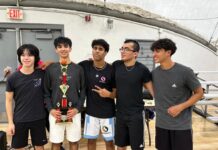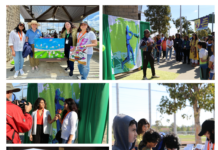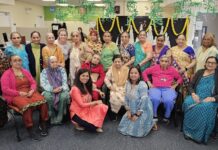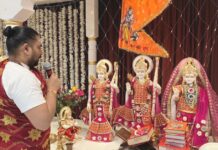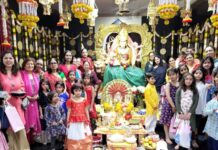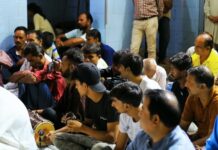
FREMONT: In 1900, Swami Vivekananda was invited by Rev. Benjamin Fay Mills to First Unitarian Church of Oakland. Swami Ji delivered a series of lectures on ‘The Claims of Vedanta on the Modern World’ and ‘Vedanta and Christianity’.
For four months Swami Vivekananda lectured and taught classes in San Francisco, Oakland and Alameda, traveling back and forth across the Bay, sowing the seeds of the exalted, universal ideas of Vedanta. His lectures were an instant hit and many people had to be refused access to the church at that time as there was no room to accommodate everyone.
On Saturday January 12th, 150th birth anniversary celebrations were initiated at the same place, in front of the same pulpit in Hamilton Hall. The event was a symbol of spiritualism and was attended by many community and religious leaders.
Kickoff event was attended by almost four hundred people ranging in faith from Hindu, Christian, Buddhist, Jewish, Unity and Muslims. They came to the First Unitarian Church of Oakland to commemorate the life and works of Swami Vivekananda.
Sitting in rapt attention in historic Hamilton Hall, the assembly listened attentively to swamis, ministers and dignitaries who spoke from the very same pulpit where Swami Vivekananda had lectured over one hundred years ago.
Consul General of India N. Parthasarthy stressed that Swamiji’s greatness was in the fact that he was able to make Hinduism accessible to the West.
Swamiji emphasized that “You should live life like a droplet on the lotus leave. While being aware of the environment, you need to be detached from it. This does not mean that you live in a vacuum, but you need to be detached while living in the materialistic world. It does not matter how long you live, what matters is the quality of life you live”.
Swami Prapannananda of the Vedanta Society of Sacramento, speaking about Swami Vivekananda’s visit to America, urged all in attendance to follow the words of Swamiji, “Let us live and stand in God. Let us lift ourselves above the vanities of the world. Let us feel the oneness of life.”
Swami Prasannatmananda of the Vedanta Society of Berkeley, speaking on Vivekananda’s life and teachings, stated “You cannot have a spring without a stream. Just as Jesus was to St. Paul or Krishna to Arjuna, so was Ramakrishna to Vivekananda. Ramakrishna was the fountain, Swami Vivekananda the pure stream, taking peace and wisdom to all mankind. Swami Vivekananda was born to fulfill a divine purpose for the good of the world.”
Swami Tattwamayananda of the Vedanta Society of Northern California, in speaking of the philosophy of Swami Vivekananda stressed that “Talk is academic, the importance of Swami Vivekananda was that he had experienced what he preached. He taught that religion is not opposed to reason, science and technology, rather it can accommodate it. Swami Vivekananda’s uniqueness was in the fact that “he reconciled philosophy, mysticism and theology.”
At the close of the day, Unitarian Reverend Kathy Huff offered a beautiful summation of Swami Vivekananda’s spiritual message and the 150th anniversary celebration: “There is unity in diversity and together we make it real.”
Events are planned throughout the year to celebrate Swamiji’s 150th birth year. Next event planned is a musical event at Flint Center, Cupertino on April 20th 2013.
Opening floodgates of spirituality
Among the voices of the prophets that continue to reverberate through the corridors of time, few are more meaningful to modern man or carry more power to the modern mind, than the voice of Swami Vivekananda, the 19th century monk and spiritual teacher who burst upon the western world like a thunderclap at the Chicago World’s Parliament of Religions in 1893.
“Sisters and Brothers of America,” he began, and thousands rose to their feet in applause.
Born in Calcutta, India on January 12, 1863, Swami Vivekananda was one of the first emissaries from the east to bring the science of Yoga and spirituality to the western world. In 1900, during his second visit to America, Swami Vivekananda was introduced to the East Bay through the First Unitarian Church of Oakland.
The swami was invited to participate in a local Congress of Religions by First Unitarian Church of Oakland minister, Reverend Benjamin Fay Mills. Reverend Mills had attended the 1893 Parliament of Religions and been moved by Swami Vivekananda’s stirring words. Having learned that the swami was lecturing in southern California, Reverend Mills issued an invitation to him, knowing that the swami would be extremely popular.
Swami Vivekananda delivered the first of eight talks at the First Unitarian Church of Oakland on the evening of February 25, 1900 from the pulpit of Hamilton Hall. Two thousand people listened in rapt attention as the swami spoke on, “The Claims of Vedanta on the Modern World.” Some days later he gave another public lecture on “Vedanta and Christianity,” and in March two series of three lectures each in the adjoining Wendte Hall.
Reverend Mills’ expectations regarding the swami’s effect on the congregation were completely fulfilled. As many as 500 people had to be turned away for lack of space. All of his talks drew large crowds, who sat or stood on the edges of the foyer, enthralled, listening to his words of ancient wisdom.
Through these lectures, which were covered colorfully by the local newspapers, Swami Vivekananda opened the floodgates of spirituality into the Bay Area, and earned the designation “A modern saint of India.”
Ritu Maheshwari
India Post News Service

